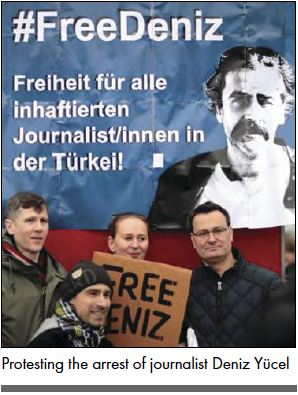German Government Draws the Line

BERLIN — If Turkish President Recep Tayyip Erdogan thought he could celebrate the first anniversary of the attempted coup by cementing his dictatorial rule at home and intimidating allies abroad, he made a serious miscalculation, which may end up costing more than he could have imagined. By exacerbating tensions with Germany, he has approached a breaking point neither he nor many in Berlin thought possible. On July 15, the anniversary of the coup attempt attributed to the Fetullah Gülen movement, the Turkish president celebrated by staging mass rallies, followed by a new wave of arbitrary arrests and accusations leveled against persons and institutions related to Germany. A day earlier it became known that Turkey had refused to allow members of the German Bundestag (Parliament) their lawful right to visit German troops stationed at the NATO base in Konya, “postponing” the visit due to a “deterioration” in bilateral relations. On July 17, a number of human rights activists earlier detained, were formally arrested on trumped up charges of supporting terrorism. Primary among them was Peter Steudtner, a German citizen, taken into custody for up to 5 years. Since the coup attempt last year, 22 Germans had been arrested, including journalist Deniz Yücel, and nine are still in prison.At the same time, it was reported in Zeit magazine, that the German Criminal Police (Bundeskriminalamt) had received a “black list” of names of 68 persons and agencies (later corrected to 700), from Turkish authorities, accused of having connections to the Gülen movement. Among them were big industrial groups like BASF and Daimler. When the BKA demanded further information, nothing came and the list was ridiculed in Berlin as “absurd” and “ridiculous.” The German press quickly put two and two together, and reckoned that Erdogan, by arresting German journalists and others, was essentially taking hostages that he might offer in exchange for the extradition of persons in Germany he wanted to put on trial. Among the latter would be Turkish military and diplomatic personnel who have filed for political asylum since the coup attempt.

The Last Straw
This time the blackmail coming from Ankara backfired. On July 19, the Turkish ambassador was summoned by the German Foreign Ministry, and “clearly told that the arrest of Peter Steudtner and other human rights activists was not comprehensible, not acceptable and certainly inexplicable.” Berlin demanded his immediate release, and characterized the assault on the human rights group as a “dramatic escalation.”
Underlining the seriousness of the incident, Foreign Minister Sigmar Gabriel cut short his vacation and flew back to the capital. Gabriel accused Turkey of having abandoned European values and announced a new direction in German foreign policy. “De-escalation is in principle a good thing,” he said, but “we need a change in course, so as not to make ourselves ridiculous — even if it comes at a price.” The concrete steps that followed are capable of delivering a negative economic impact. First, Gabriel said that travel warnings for Germans going to Turkey would be expanded, since virtually anyone could be fair game. Tourists should report to the German consular offices. Already, bilateral tensions have cut into Turkey’s revenue from German tourists, whose numbers are second only to the Russians. Then trade relations are to be reviewed, as Gabriel said he found it difficult to encourage German investments in a country where no real legal framework existed. As reported in Spiegel magazine, Germany is Turkey’s most important trade partner, in 2016 to the tune of 37 billion euros; about 15 billion euros in imports to Germany and 22 billion in exports to Turkey. German investments stand at 12 billion, so if the Hermes export credits are reduced or withdrawn, as Gabriel has suggested, that could have a devastating effect. Furthermore, Germany wields power in EU-Turkish relations; Gabriel stated, “I can’t imagine that negotiations for the expansion of the customs union will take place” in such a situation. Not only is the customs union being questioned, but the very process of talks on EU membership are de facto on ice, and CSU chairman Horst Seehofer, endorsing the new government policy, said he thought the talks should be cancelled and the 4.2 billion euros slated to support the process between now and 2020 be stopped. Germany is receiving backing not only from Austria but also from the EU Commission in its new response to the “destructive course” of Erdogan’s policy, as EU Expansion Commissioner Johannes Hahn put it.
The arms sector was also affected. On July 21, a spokesman for the German Economics Ministry stated officially that all orders and applications for arms deals were being subjected to thorough review. Though some orders last year had been denied, deliveries to the tune of 100 million euros had been approved since January 2016. It was reported on July 21 that the agency responsible would not issue any new permits. This is no small matter considering that in 2016 Germany had approved arms exports worth 83.9 million euros and in the first four months of 2017, 22 million, according to the Frankfurter Allgemeine Zeitung. Turkey is, after all, a NATO member.
Message Received
This time Ankara seemed to sit up and take notice, albeit with much fuss and bluster. While fuming that “No one has a right to interfere in the internal affairs of Turkey” (by demanding the release of prisoners), and categorically stating that Turkey “is a democratic, social state of law,” Erdogan found himself on July 23 also pleading that the “strategic partnership” with Germany should not be overshadowed by events. He added that reports that Turkish authorities were investigating German groups on suspicion of terrorism were outright lies. On July 24, this line was made official. A spokesman for the German Interior Minister Thomas de Mazière announced that his Turkish counterpart had told him by phone that there had been a “communications problem,” some sort of misunderstanding, that is, and that no Germans were being investigated by Turkey, in either country. (The Turkish Economics Minister Nihat Zeybekci had also raised doubts that such a black list ever existed.) De Mazière’s spokesman then declared that the Interpol office in Ankara which had originally asked the BKA for information on the blacklisted names had “formally withdrawn” the request.
It is important to stress that, although Germany has entered an election campaign period, there is agreement across the political spectrum regarding the need to draw a firm line with provocations from Turkey. German Finance Minister Wolfgang Schäuble, from the CDU, had unusually harsh words for Erdogan: “He is placing the hundred-year-long partnership between Turkey and Germany in jeopardy,” adding, “It is certainly dramatic. But we cannot let ourselves be blackmailed.” His party colleague Volker Kauder, head of the CDU/CSU Parliamentary faction, said economic pressure was absolutely necessary; “We have to tell Turkey that it cannot go on like this.” On the issue of the German government’s rights to visit its troops, Kauder stressed the fact that the troops are there not for Turkey but as part of the coalition against the so-called Islamic State. SPD politician Wolfgang Hellmich, who is Defense Committee chairman, called for even more pressure, demanding an ultimatum for the visit be set for late August.
He also said the issue had to be clarified more fundamentally, as one could not become dependent on “arbitrary case-by-case decisions by Turkey.” As for NATO, Secretary General Jens Stoltenberg tried to mediate on July 24, by proposing that a NATO parliamentary delegation be organized to visit Konya.
The Die Is Cast
Whatever compromise solution here might be reached, it is clear that a new chapter has opened in German-Turkish relations. In a summer interview on national television on July 24, President Frank-Walter Steinmeier, whose official position is considered politically neutral, minced no words regarding his Turkish counterpart: “Erdogan is trying to tailor the country to his own liking,” meaning his own aspirations to power. The “rest of the critics and opposition” are being persecuted, thrown into prison and silenced, he said. Even former members of Erdogan’s AKP were being oppressed. Throwing his support behind the new German policy thrust, Steinmeier said “we cannot accept” what is going on in Turkey, it is “also a question of the self-respect of Germany.” And for this reason, it is right “to send clear signals.” No matter how deep the crisis has become, threatening the very existence of bilateral relations as Schäuble put it, Foreign Minister Gabriel has gone to great lengths to explain the matter to Turks in Germany. Over the past year in particular, the escalating social-political conflict inside Turkey has spilled over into Germany, at an alarming pace and intensity, threatening violence within the community.
Repeatedly German politicians have sought to reestablish calm. To make his bid for understanding, Gabriel addressed the Turkish community in a bilingual message published in the Sunday edition of the mass tabloid Bild Zeitung, and spoke in the name of the whole government. These citizens and residents of Turkish background see the difficulties in bilateral relations, he said; your homeland is Germany, but for many it is also in Turkey. For this reason, “we want to say to you: the friendship between Germans and Turks is a great treasure. We have always worked for good relations with Turkey also because we know that a good relation between Turkey and Germany is important for you.” Then his tone sharpened: “Now however innocent German citizens are being put in prison. As the German government. we cannot idly stand by. We have to protect our citizens.” This is the reason, he went on, for the change in German policy, whereby cooperation and economic aid will be re-examined, also on a European level. Most emphatically, Gabriel stated that “None of this is aimed against people in Turkey and our citizens of Turkish background in Germany” and concluded that, no matter how difficult matters become, those of Turkish background in Germany “belong to us – whether with or without a German passport.”
(Quotations from German sources have been translated by the author.)

